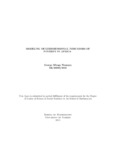Modeling Multidimensional Indicators of Poverty in Africa
| dc.contributor.author | Wamuyu, George M | |
| dc.date.accessioned | 2016-11-21T13:32:01Z | |
| dc.date.available | 2016-11-21T13:32:01Z | |
| dc.date.issued | 2015 | |
| dc.identifier.uri | http://hdl.handle.net/11295/97648 | |
| dc.description.abstract | Poverty is a condition in which a person or community is lacking the basic needs required for a minimum standard of well-being. Poverty can be measured using eco- nomic, social and environmental indicators. Past research on measuring poverty has been done using an income approach. The income approach considers only one dimen- sion of poverty and fails to consider other dimensions such as social and environmental dimensions. The aim of this study is to develop a concept of measuring poverty using a multidimensional approach.We used data from the Ethiopia Demographic Health Survey. Multi-Correspondence Analysis and Non Linear Principal Component Anal- ysis were used to extract and weight indicators of poverty.The weighted indicators were then used to construct a Poverty index.This index can assist policy makers in quantifying poverty. | en_US |
| dc.language.iso | en | en_US |
| dc.publisher | University of Nairobi | en_US |
| dc.rights | Attribution-NonCommercial-NoDerivs 3.0 United States | * |
| dc.rights.uri | http://creativecommons.org/licenses/by-nc-nd/3.0/us/ | * |
| dc.subject | Modeling Multidimensional | en_US |
| dc.title | Modeling Multidimensional Indicators of Poverty in Africa | en_US |
| dc.type | Thesis | en_US |



